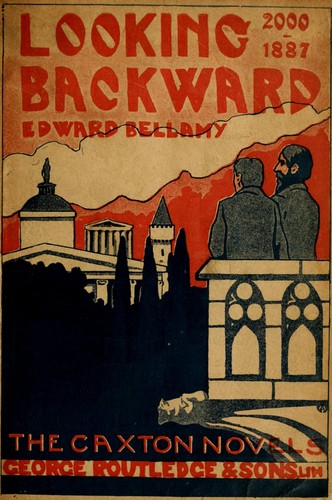looking backward (1887) & moving forward
As part of a new directive I'm trying to eschew into my life, of my hobbies serving me more than I serving them, I'm moving against my better judgment to not force myself to finish this novel for completion's sake and instead giving up on it. I didn't fail the book, it failed me.
Right?
Perhaps introspection is at it's best without inspection; I can feel like I'm making forward progress blissfully that way. Anywho, on to the gripes I have with the book.
First off, to Bellamy's greatest effort, this is a manifesto masquerading as a novel. We open on our protagonist and receive one chapter of actual storytelling before we're thrown into various extremely dry didactic conversations that serve merely as an instrument for Bellamy to describe his perfect socialist utopia. The balance of these two narratives feel unproportionally weighted and deleterious to each other. Like, Julian comes out of 130 years of sleep and doesn't reminisce or remorse for his now dead fiance whatsoever and instead falls for the first woman he sees. Men suck, but can we at least get it right in the make-believe world of literature? The failure to ground the socialistic teachings in any sort of in-world importance just makes me feel as if the book & Bellamy are of two minds and essentially weighed down by the narrative constraints.
To add to this, as we don't care for Julian, the teachings offered by Dr. Leete feel more like my favourite song from 'The Nightmare Before Christmas': 'What's this?'. But gone is the catchy tune and inventive stop motion imagery, and instead Julian saying 'But how on earth is this possible?' and Dr. Leete responding 'Money is gone so people are good now.' A message I can get behind as a red-blooded red, but it was after 15 chapters of this repeating over and over that I had to call it quits. In total, I read 59% of the book and after skimming sparknotes, I'm glad I dipped before Bellamy had a chance to grace my eyes with his antiquated views of the woman's place in his utopia. It sounds a paradox, antiquated progressive views but leave it to this book.
As a final note, I best turn the mirror back at me. I got on to reading this book after skimming prominent Japanese Communist Sanzo Nosaka's Wikipedia page. He was inspired by this book, and perhaps maybe I would be as well if it were the early 20th century and I was surrounded by the horrors of industrial capitalism. Perhaps I would have latched onto this book if I were to have read it in High School, a physical anchor to throw toward my centre-right friends. I appreciate all the nationalist tendencies and the humanist approach the manifesto takes, but I'm older now. I exist in a post-Orwell world, one where a man mad enough to mail bombs to people saw many more deleterious strains in socioeconomics than just [no money + nationalist production = solved]. I'm just more cynical now, and when Bellamy bangs on about consolidation of power, it's hard not to feel the twinge of your local Musk bootlicker mentioning a certain Orwell book he's never read but has the fragment of a point. As a worker, I wanna control the means of production, but at what cost?
So if you want to live in a world where money is gone and people are good, check out any Star Trek. It has aliens & scientific socialism. We contain multitudes, people.

Comments
Post a Comment